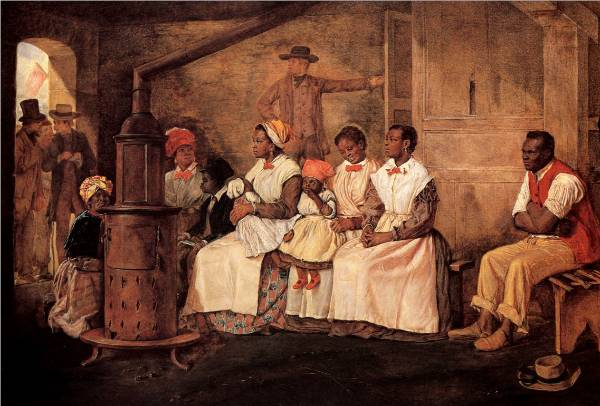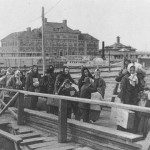I was going to write up a bit of an explanation of how the German healthcare system works, both the basic mechanics and my and my in-laws’ experiences. But it occured to me that I want to (a) ask my husband where the hospital and doctors’ bill tallies are from our time there and (b) get his input on the topic overall — and he’s out of town right now.
And in the meantime, I’d been meaning to write up some of the stories I’ve learned in the process of researching our family tree. Maybe not your cup of tea — but I was thinking about some of these stories in the context of the minimum wage debate, and the question of whether an individual without any specialized skills or training or ability should be able to support a family, as a sort of moral imperative. And some of this I think is interesting in its own right, as a story rather than as just my own family history.
So I offer to you:
On my mother’s side:
My maternal grandfather immigrated from Greece. The story is that his father came first, to St. Louis, then his mother and siblings, but he stayed in Greece to complete his schooling, joined the Greek Merchant Marine (having reduced his age by one year from 18 to 17 to avoid being drafted into the military instead), and then jumped ship upon arriving in the US and rejoined his family. The census documents show that in 1920, they all worked at the family business, a lunch counter (typical Greeks), with my great-grandfather having immigrated in 1894 (which means that he must have made multiple crossings in order to procreate, with the children being born in 1900, 1902, and 1904), and the rest of them in 1914 — and we do indeed have the Ellis Island record for my great-grandmother and great-aunt and uncle, but not my grandfather (one wonders if they said they all arrived in 1914 out of suspicion that my grandfather could get in trouble?).
In 1920, my grandfather was a part of the family business, but later he was a barber, then an insurance salesman. He also was the only one to marry outside the Greek Orthodox church, and do so twice (his first wife died in a car accident before he married my grandmother), and to, indeed leave the Orthodox church in terms of his own beliefs. Apparently there was some strife over this, and it was a while before my grandmother was accepted into the family. I would be curious which came first — the courting of a non-Greek wife, or leaving the Orthodox church — and whether this was all part and parcel of a decision to assimilate fully into American life and culture, since he also played violin in the St. Louis Philharmonic Orchestra, and there’s a picture of him in a theatre group in the 20s.
We don’t know particularly much about his family history. How poor or wealthy was his family back in Greece? I don’t know. It would help if the Greeks had their genealogical records online, or, for that matter, if I could read Greek. We have a picture of the family, with my grandfather in a sailor suit, my great-aunt in a frilly dress, and my great-grandmother looking respectably-middle class. The story is that later, my great-grandfather travelled back to Greece to sell some land. Certainly they had to have some cash for my great-grandfather to make multiple crossings. But I don’t know more than that.
My maternal grandmother’s family history goes back a couple more generations and has a few more twists.
Amelia Schwartz was born in Germany in 1858, arrived in the United States in 1870, and married Wihelm Wittkoetter in 1885. Her daughter Amelia Wittkoetter was my great-grandmother, and I’ve seen a picture of her as a teenager in an old family album with that name on the back. But the story wasn’t quite as simple.
Amelia was born in 1890, the third of four daughters, Theresa (1886), Annie (1887), and Lillie (1892) being the others. But Wilhelm died of consumption — in 1887.
Later Amelia (the mother) paired up with Edward de Bush, and there exist birth records for Lillie as well as two infants, both named Rosa, who died in infancy in 1895 and 1897. Then unluckily for Amelia, Edward himself died, that same year.
One of these days, I’d like to see if the old parish church still has records for the family. When did Amelia marry Edward? Marriage records were spotty at the time. Was it before Amelia was born? If so, why did she call herself Wittkoetter? Or was Amelia, the daughter, an illegetimate child born before Amelia, the mother, met Edward — and the lack of such nicities as birth certificates meant that she was able to reinvent her history and move Wihlelm’s death date forward a couple years? (For that matter — are there even earlier records? Did Amelia come over from Germany at the age of 12 by herself? Or, if not, what happened to her family?)
(This leaves me wondering what proper genealogical rules are here: do we just consider this a dead end? Or do we consider step-parents or dead claimed-fathers to be part of our ancestry and research them?)
And the 1900 census found the unlucky family living in poverty. They moved from 1208 Palm Street to 1200 1/2 Palm Street (now a parking lot next to the freeway), which meant a back apartment facing the alley, and Theresa, now age 14, has left school to help her mother earn a living as a washerwoman. What’s interesting is that they’ve reinvented themselves in name, from German to French — Theresa has now become Treca, and the Amelias are now Emile.
But their fortunes improve. Well, Amelia’s and Theresa’s did, anyway (Lillie moved away and married, and we think Annie just died somewhere along the way), as they both found well-off suitors — Richard and Richard Stapleton. Not mere coincidence — Theresa married Richard Sr., some 25 years her senior, and moved with him to Chicago, and Amelia married Richard Jr. — though her good fortune didn’t last as she had one baby die, then Richard himself died in a motorcycle accident shortly after my grandmother was born. (She later remarried and had two more children and ultimately ended her days in a less-tragic fashion.)
This was one of the more surprising discoveries, to be sure — looking at Theresa’s death certificate, as the wife of Richard Stapleton, and realizing it was no mere coincidence that the name given for her mother and father matched that of Theresa, Amelia’s sister. And then, talking to my mother, she said, “I guess that explains why we always had to visit Theresa (who was by the time my mother was a child a somewhat grumpy old woman); I always wondered why it was so important to stay in touch with my great-grandfather’s second wife.”
We have information going back further on the Stapleton side — they were, of course, from Ireland, but by way of Quebec. Who’d have thought that the Irish would have immigrated to Quebec?
So that’s my mother’s side — the highlights, at least.
On my father’s side, there are some (to me) interesting stories as well (and some kings and saints) — but I’ve already spent more time writing this up than planned, and never did make the big philosophical connections I’d planned. But — sure glad I’m Jane the Actuary, not Amelia the Widowed Washerwoman.












